#science news 2019
Explore tagged Tumblr posts
Photo

Evolution by Christoph Niemann
42 notes
·
View notes
Text
























On February 27, 1860 Abraham Lincoln made a speech at Cooper Union in the city of New York that is largely responsible for his election to the Presidency. It is now referred to as the Cooper Union Address.
#The Cooper Union for the Advancement of Science and Art#Abraham Lincoln#speech#Cooper Union#Cooper Union Address#27 February 1860#USA#Manhattan#New York City#summer 2019#Cooper Union's Foundation Building#Italianate style#Fred A. Petersen#Stanley J. Watts#Gettysburg#travel#vacation#Mount Rushmore National Memorial#Gutzon Borglum#165th anniversary#US history#original photography#tourist attraction#cityscape#landmark#architecture
2 notes
·
View notes
Text
For Nature’s new series on sex/gender, I wrote with the amazing Shari Brightly-Brown and G Nic Rider about gender modality, the limits of the cis/trans binary, and how to study gender more respectfully and accurately.
Gender modality is a term I coined in 2019 that has picked up a lot of steam in the last few years. It refers to the relationship between someone’s gender identity and gender assigned at birth. It’s a lot like ‘sexual orientation’ but for trans/cis instead of gay/straight.
The term helps us be more accurate and more respectful when describing the experiences of trans people, and opens up space beyond the trans/cis binary.
For instance, it’s often more accurate to say that discrimination against trans people is based on gender modality than based on gender identity. After all, a trans woman has the same gender identity as a cis woman, so that’s not the salient point.
There are also many people who don’t neatly fall in the trans/cis binary, and gender modality helps us talk about that. Non-binary people who don’t identify as cis or trans, gender questioning folks, detrans folks, people with culturally-specific identities, etc.
Our world is incredibly rich with experiences and our language should reflect that. As we say in the paper, the first step in science shouldn’t be assuming, it should be to engage in the world in all its magnificent complexity.
I am grateful to our editor for the opportunity to publish in such a prestigious journal with such amazing coauthors. I hope you all enjoy the read!
For those who prefer to listen, here’s an audio version.
#lgbtq#transgender#queer#lgbtqia#trans#lesbian#lgbt#gay#gender affirming care#gender affirming healthcare#trans health#trans healthcare#science#research#academia
2K notes
·
View notes
Text
It's always good news when a rare native species rebounds from the brink of extinction. The Kirtland's warbler was once down to about two hundred individuals, but with conservation efforts the population is almost to five thousand. This is still a very small number, but it's a heartening change.
The warbler was removed from the U.S. Endangered Species List in 2019. While this may seem like a good thing, it means these birds have lost some of the legal protection that earned them breathing room to recover. It also highlights the very procedural, quantitative way in which government entities try to define whether a species or habitat is "safe" or not. It's not as though once the warbler was off the list its problem all disappeared. Plus there are many species that face extinction that have never been listed simply because the data hasn't been sufficient--or even existent--to prove the threat.
And it also reflects the reductionist view toward science that is still all too common. While restoration ecologists and other conservationists are well aware of the interconnectivity of an ecosystem and how it is more than the sum of its parts, the idea that a single species is endangered in isolation ignores the complex interplay between species and habitat, and how habitat loss is the single biggest cause of endangerment and extinction across the board.
So while we celebrate rising numbers of Kirtland's warblers, we also need to be focused on protecting and restoring the pine forests of the upper Midwest that they prefer in summer, and their wintering grounds in the Bahamas. Moreover, we need to appreciate the need of all the beings in these habitats to have their homes and feeding grounds protected in total, not just a single species here and there. The warbler is just a starting point, and its continued success relies on the health of the intricate systems of which it is a part.
#birds#warblers#Kirtland's warbler#endangered species#extinction#birdblr#nature#wildlife#animals#ecology#environment#conservation#science#scicomm#birding#habitat restoration#restoration ecology#good news#positive
764 notes
·
View notes
Text
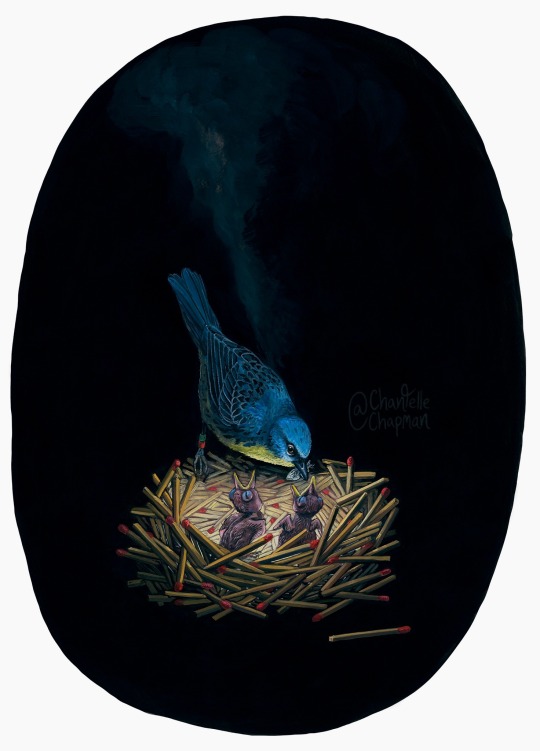

It was never a common species, the blue-grey warbler that locals called the jack pine bird. A belated discovery among American birds, it was undescribed by science until the mid 19th century—and then, known only on the basis of a single specimen. The bird's wintering grounds in the Caribbean would eventually fulfill the demands of collectors and museums, but the intricacies of its lifecycle remained a mystery for decades, the first nest only found in 1903. As the already-rare bird became rarer, people could only guess at why. There were just so few birds to look for, their breeding habitat inscrutable amidst the dense, impassable woodland of their Midwestern home. The one clue was the most apparent thing about the bird: its affinity with the jack pine (Pinus banksiana).
Over time, more nests were found—not in the eponymous trees, as might be expected for a songbird, but on the ground at their feet. Data points converged, leading to the realization that not only did the bird nest almost exclusively in proximity to the scrubby pines, but only utilized trees that fell within a specific range: new growth, between five and fifteen feet tall, with branches that swept shelteringly close to the ground. Subsequently, it would be noticed that the greatest volume of specimen collection for the bird had corresponded with years in which historically significant wildfires had impacted the Midwest—fires that, for decades afterwards, had been staunchly suppressed. The pieces fell into place, like jack pine seeds, whose cones open only under the heat of a blaze.
With the bird's total population having dwindled to the low hundreds, a program of prescribed burns, clearcutting, and replanting was instituted, with many acres of land purchased and devoted to the preservation and maintenance of suitable breeding habitat. Concurrently, efforts were made to protect the vulnerable bird against brood parasitism by the brown-headed cowbird.
When the first federal list of protected species was put forward in 1966, the name of the small grey warbler was inscribed beside birds such as the Kauai ʻōʻō and the Dusky Seaside Sparrow.
The ʻōʻō, last of the genus Moho, would be removed from the list in 2023 due to extinction, after thirty-six years without a sighting.
The endling Dusky Seaside Sparrow, a male named Orange Band, would die of old age in captivity in 1987, with his species being delisted three years later.
in 2019, fifty-two years after the creation of the Endangered Species Protection Act, the name of Kirtland's warbler, too, was removed from the list: it had been determined that, with a population now numbering nearly 5000, the jack pine bird could be considered safely stable.
Conservationists continue to work to preserve the breeding habitat of Kirtland's Warbler in the midwestern US, as well as its winter roosts in the Bahamas and neighboring islands (though selective logging has replaced actual burning in recent years, due to the dangers posed by unpredictable fires). It's the kind of effort that it takes to undo the damage we've caused to the planet and its creatures—the kind of hope that we need, to not give up on them, or on ourselves.
-
The title of this piece is Prescribed Burn (Kirtland's Warbler). It is traditional gouache on 18x24" watercolor paper, and is part of my series Conservation Pieces, which focuses on efforts made to save critically endangered birds from extinction.
#kirtland's warbler#conservation#bird art#extinction stories#bird extinction#endangered species#series: conservation pieces
1K notes
·
View notes
Text
"When a severe water shortage hit the Indian city of Kozhikode in the state of Kerala, a group of engineers turned to science fiction to keep the taps running.
Like everyone else in the city, engineering student Swapnil Shrivastav received a ration of two buckets of water a day collected from India’s arsenal of small water towers.
It was a ‘watershed’ moment for Shrivastav, who according to the BBC had won a student competition four years earlier on the subject of tackling water scarcity, and armed with a hypothetical template from the original Star Wars films, Shrivastav and two partners set to work harvesting water from the humid air.
“One element of inspiration was from Star Wars where there’s an air-to-water device. I thought why don’t we give it a try? It was more of a curiosity project,” he told the BBC.
According to ‘Wookiepedia’ a ‘moisture vaporator’ is a device used on moisture farms to capture water from a dry planet’s atmosphere, like Tatooine, where protagonist Luke Skywalker grew up.
This fictional device functions according to Star Wars lore by coaxing moisture from the air by means of refrigerated condensers, which generate low-energy ionization fields. Captured water is then pumped or gravity-directed into a storage cistern that adjusts its pH levels. Vaporators are capable of collecting 1.5 liters of water per day.

Pictured: Moisture vaporators on the largely abandoned Star Wars film set of Mos Espa, in Tunisia
If science fiction authors could come up with the particulars of such a device, Shrivastav must have felt his had a good chance of succeeding. He and colleagues Govinda Balaji and Venkatesh Raja founded Uravu Labs, a Bangalore-based startup in 2019.
Their initial offering is a machine that converts air to water using a liquid desiccant. Absorbing moisture from the air, sunlight or renewable energy heats the desiccant to around 100°F which releases the captured moisture into a chamber where it’s condensed into drinking water.
The whole process takes 12 hours but can produce a staggering 2,000 liters, or about 500 gallons of drinking-quality water per day. [Note: that IS staggering! That's huge!!] Uravu has since had to adjust course due to the cost of manufacturing and running the machines—it’s just too high for civic use with current materials technology.
“We had to shift to commercial consumption applications as they were ready to pay us and it’s a sustainability driver for them,” Shrivastav explained. This pivot has so far been enough to keep the start-up afloat, and they produce water for 40 different hospitality clients.
Looking ahead, Shrivastav, Raja, and Balaji are planning to investigate whether the desiccant can be made more efficient; can it work at a lower temperature to reduce running costs, or is there another material altogether that might prove more cost-effective?
They’re also looking at running their device attached to data centers in a pilot project that would see them utilize the waste heat coming off the centers to heat the desiccant."
-via Good News Network, May 30, 2024
#water#india#kerala#Kozhikode#science and technology#clean water#water access#drinking water#drought#climate change#climate crisis#climate action#climate adaptation#green tech#sustainability#water shortage#good news#hope#star wars#tatooine
1K notes
·
View notes
Text
Fatboy Slim - Right Here, Right Now 1999
"Right Here, Right Now" is a song by British big beat musician Fatboy Slim, released on 19 April 1999 as the fourth single from his second studio album, You've Come a Long Way, Baby (1998). The song samples "Ashes, the Rain & I" by James Gang and an Angela Bassett quote from American science fiction thriller film Strange Days (1995). (Watch the scene here!) "Right Here, Right Now" reached number two on the UK Singles Chart and became a top-40 hit in Australia, Greece, Iceland, Ireland, New Zealand, and the Walloon region of Belgium. The song's popularity was spread across Europe through viral use in advertisements by companies such as Adidas. In February 2013, Mixmag readers voted for it to be number 10 on a list of 50 of the greatest dance tracks.
The music video for the song, created by Hammer & Tongs, is an elaborate homage to the famous opening sequence of the French educational series Once Upon a Time… Man. It shows a timeline depicting a simplified process of evolution condensed into three and a half minutes, starting billions of years ago with a single-celled eukaryote in the ocean. On August 12, 2012, Fatboy Slim performed "Right Here, Right Now" alongside "The Rockafeller Skank" at the Summer Olympics closing ceremony in London. On 8 October 2019, Fatboy Slim made a remix of the song using environmental activist Greta Thunberg's United Nations speech.
"Right Here, Right Now" received a total of 70% yes votes! Previous Fatboy Slim polls: #12 "Weapon of Choice", #237 "Praise You", #363 "The Rockafeller Skank".
youtube
370 notes
·
View notes
Text
NASA Inspires Your Crafty Creations for World Embroidery Day
It’s amazing what you can do with a little needle and thread! For #WorldEmbroideryDay, we asked what NASA imagery inspired you. You responded with a variety of embroidered creations, highlighting our different areas of study.
Here’s what we found:
Webb’s Carina Nebula

Wendy Edwards, a project coordinator with Earth Science Data Systems at NASA, created this embroidered piece inspired by Webb’s Carina Nebula image. Captured in infrared light, this image revealed for the first time previously invisible areas of star birth. Credit: Wendy Edwards, NASA. Pattern credit: Clare Bray, Climbing Goat Designs
Wendy Edwards, a project coordinator with Earth Science Data Systems at NASA, first learned cross stitch in middle school where she had to pick rotating electives and cross stitch/embroidery was one of the options. “When I look up to the stars and think about how incredibly, incomprehensibly big it is out there in the universe, I’m reminded that the universe isn’t ‘out there’ at all. We’re in it,” she said. Her latest piece focused on Webb’s image release of the Carina Nebula. The image showcased the telescope’s ability to peer through cosmic dust, shedding new light on how stars form.
Ocean Color Imagery: Exploring the North Caspian Sea
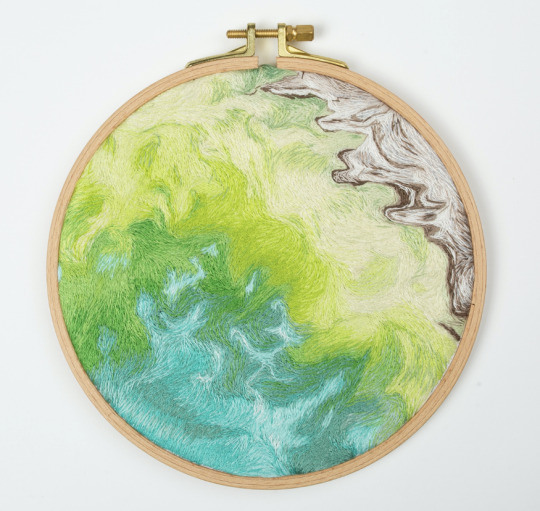
Danielle Currie of Satellite Stitches created a piece inspired by the Caspian Sea, taken by NASA’s ocean color satellites. Credit: Danielle Currie/Satellite Stitches
Danielle Currie is an environmental professional who resides in New Brunswick, Canada. She began embroidering at the beginning of the Covid-19 pandemic as a hobby to take her mind off the stress of the unknown. Danielle’s piece is titled “46.69, 50.43,” named after the coordinates of the area of the northern Caspian Sea captured by LandSat8 in 2019.

An image of the Caspian Sea captured by Landsat 8 in 2019. Credit: NASA
Two Hubble Images of the Pillars of Creation, 1995 and 2015

Melissa Cole of Star Stuff Stitching created an embroidery piece based on the Hubble image Pillars of Creation released in 1995. Credit: Melissa Cole, Star Stuff Stitching
Melissa Cole is an award-winning fiber artist from Philadelphia, PA, USA, inspired by the beauty and vastness of the universe. They began creating their own cross stitch patterns at 14, while living with their grandparents in rural Michigan, using colored pencils and graph paper. The Pillars of Creation (Eagle Nebula, M16), released by the Hubble Telescope in 1995 when Melissa was just 11 years old, captured the imagination of a young person in a rural, religious setting, with limited access to science education.
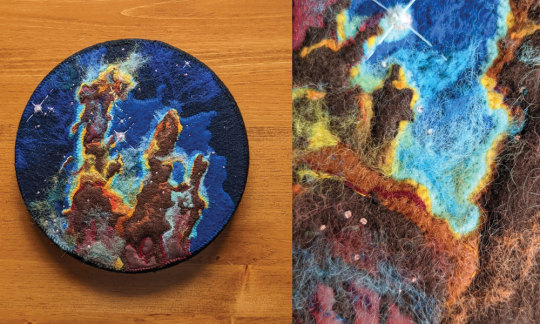
Lauren Wright Vartanian of the shop Neurons and Nebulas created this piece inspired by the Hubble Space Telescope’s 2015 25th anniversary re-capture of the Pillars of Creation. Credit: Lauren Wright Vartanian, Neurons and Nebulas
Lauren Wright Vartanian of Guelph, Ontario Canada considers herself a huge space nerd. She’s a multidisciplinary artist who took up hand sewing after the birth of her daughter. She’s currently working on the illustrations for a science themed alphabet book, made entirely out of textile art. It is being published by Firefly Books and comes out in the fall of 2024. Lauren said she was enamored by the original Pillars image released by Hubble in 1995. When Hubble released a higher resolution capture in 2015, she fell in love even further! This is her tribute to those well-known images.
James Webb Telescope Captures Pillars of Creation

Darci Lenker of Darci Lenker Art, created a rectangular version of Webb’s Pillars of Creation. Credit: Darci Lenker of Darci Lenker Art
Darci Lenker of Norman, Oklahoma started embroidery in college more than 20 years ago, but mainly only used it as an embellishment for her other fiber works. In 2015, she started a daily embroidery project where she planned to do one one-inch circle of embroidery every day for a year. She did a collection of miniature thread painted galaxies and nebulas for Science Museum Oklahoma in 2019. Lenker said she had previously embroidered the Hubble Telescope’s image of Pillars of Creation and was excited to see the new Webb Telescope image of the same thing. Lenker could not wait to stitch the same piece with bolder, more vivid colors.
Milky Way
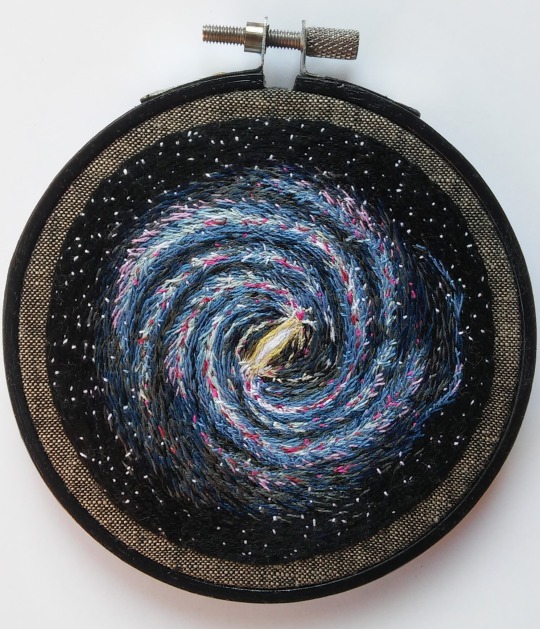
Darci Lenker of Darci Lenker Art was inspired by NASA’s imaging of the Milky Way Galaxy. Credit: Darci Lenker
In this piece, Lenker became inspired by the Milky Way Galaxy, which is organized into spiral arms of giant stars that illuminate interstellar gas and dust. The Sun is in a finger called the Orion Spur.
The Cosmic Microwave Background
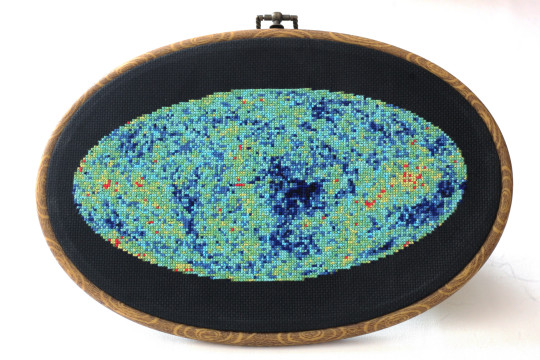
This image shows an embroidery design based on the cosmic microwave background, created by Jessica Campbell, who runs Astrostitches. Inside a tan wooden frame, a colorful oval is stitched onto a black background in shades of blue, green, yellow, and a little bit of red. Credit: Jessica Campbell/ Astrostitches
Jessica Campbell obtained her PhD in astrophysics from the University of Toronto studying interstellar dust and magnetic fields in the Milky Way Galaxy. Jessica promptly taught herself how to cross-stitch in March 2020 and has since enjoyed turning astronomical observations into realistic cross-stitches. Her piece was inspired by the cosmic microwave background, which displays the oldest light in the universe.

The full-sky image of the temperature fluctuations (shown as color differences) in the cosmic microwave background, made from nine years of WMAP observations. These are the seeds of galaxies, from a time when the universe was under 400,000 years old. Credit: NASA/WMAP Science Team
GISSTEMP: NASA’s Yearly Temperature Release
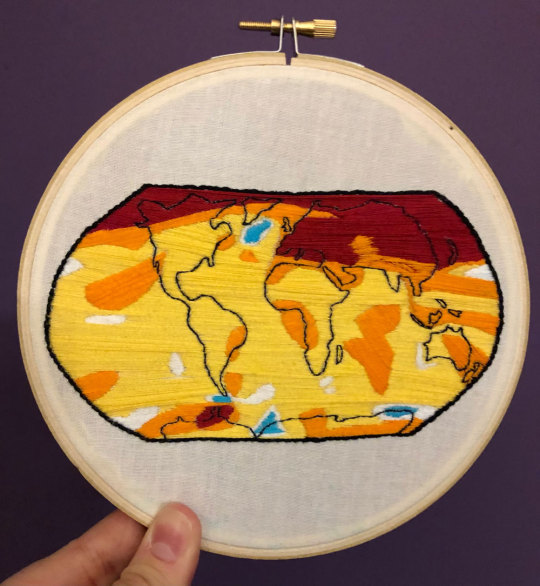
Katy Mersmann, a NASA social media specialist, created this embroidered piece based on NASA’s Goddard Institute for Space Studies (GISS) global annual temperature record. Earth’s average surface temperature in 2020 tied with 2016 as the warmest year on record. Credit: Katy Mersmann, NASA
Katy Mersmann is a social media specialist at NASA’s Goddard Space Flight Center in Greenbelt, Md. She started embroidering when she was in graduate school. Many of her pieces are inspired by her work as a communicator. With climate data in particular, she was inspired by the researchers who are doing the work to understand how the planet is changing. The GISTEMP piece above is based on a data visualization of 2020 global temperature anomalies, still currently tied for the warmest year on record.
In addition to embroidery, NASA continues to inspire art in all forms. Check out other creative takes with Landsat Crafts and the James Webb Space telescope public art gallery.
Make sure to follow us on Tumblr for your regular dose of space!
#NASA#creativity#fiber art#embroidery#art#art challenge#needlework#crafts#handmade#textile art#cross stitch#stitching#inspiration#inspo#Earth#Earth science#Hubble#James Webb Space Telescope#climate change#water#nebula#stars
6K notes
·
View notes
Note
Do you have a list of good sex ed books to read?
BOY DO I
please bear in mind that some of these books are a little old (10+ years) by research standards now, and that even the newer ones are all flawed in some way. the thing about research on human beings, and especially research on something as nebulous and huge as sex, is that people are Always going to miss something or fail to account for every possible experience, and that's just something that we have to accept in good faith. I think all of these books have something interesting to say, but that doesn't mean any of them are the only book you'll ever need.
related to that: it's been A While since I've read some of these so sorry if anything in them has aged poorly (I don't THINK SO but like, I was not as discerning a reader when I was 19) but I am still including them as books that have been important to my personal journey as a sex educator.
additionally, a caveat that very few of these books are, like, instructional sex ed books in the sense of like "here's how the penis works, here's where the clit is, etc." those books exist and they're great but they're also not very interesting to me; my studies on sex are much more in the social aspect (shout out to my sociology degree) and the way people learn to think about sex and societal factors that shape those trends. these books reflect that. I would genuinely love to have the time to check out some 101 books to see how they fare, but alas - sex ed is not my day job and I don't have the time to dedicate to that, so it happens slowly when it happens at all. I've been meaning to read Dr. Gunter's Vagina Bible since it came out in 2019, for fucks sake.
and finally an acknowledgement that this is a fairly white list, which has as much to do with biases with academia and publishing as my own unchecked biases especially early in my academic career and the limitations of my university library.
ANYWAY here's some books about sex that have been influential/informative to me in one way or another:
The Trouble With Normal: Sex, Politics, and the Ethics of Queer Life (Michael Warner, 1999)
Virginity Lost: An Intimate Portrait of First Sexual Experiences (Laura M. Carpenter, 2005)
Virgin: The Untouched History (Hanne Blank, 2007)
Sex Goes to School: Girls and Sex Education Before the 1960s (Susan K. Freeman, 2008)
Bonk: The Curious Coupling of Science and Sex (Mary Roach, 2008)
Transgender History: The Roots of Today's Revolution (Revised Edition) (Susan Stryker, 2008)
The Purity Myth: How America's Obsession with Virginity is Hurting Young Women (Jessica Valenti, 2009)
Not Under My Roof: Parents, Teens, and the Culture of Sex (Amy T. Schalet, 2011)
Straight: The Surprisingly Short History of Heterosexuality (Hanne Blank, 2012)
Rewriting the Rules: An Integrative Guide to Love, Sex and Relationships (Meg-John Barker, 2013)
The Sex Myth: The Gap Between Our Fantasies and Realities (Rachel Hills, 2015)
Come as You Are: The Surprising New Science That Will Tranform Your Sex Life (Emily Nagoski, 2015)
Not Gay: Sex Between Straight White Men (Jane Ward, 2015)
Too Hot to Handle: A Global History of Sex Education (Jonathan Zimmerman, 2015)
American Hookup: The New Culture of Sex on Campus (Lisa Wade, 2017)
Buzz: A Stimulating History of the Sex Toy (Hallie Lieberman, 2017)
Histories of the Transgender Child (Jules Gill-Peterson, 2018)
Revolting Prostitutes: The Fight for Sex Workers' Rights (Juno Mac and Molly Smith, 2018)
Ace: What Asexuality Reveals About Desire, Society, and the Meaning of Sex (Angela Chen, 2020)
Pleasure in the News: African American Readership and Sexuality in the Black Press (Kim Gallon, 2020)
A Curious History of Sex (Kate Lister, 2020)
Boys & Sex: Young Men on Hookups, Love, Porn, Consent, and Navigating the New Masculinity (Peggy Orenstein, 2020)
Black Women, Black Love: America's War on Africa American Marriage (Dianne M. Stewart, 2020)
The Tragedy of Heterosexuality (Jane Ward, 2020)
Hurts So Good: The Science and Pleasure of Pain on Purpose (Leigh Cowart, 2021)
Strange Bedfellows: Adventures in the Science, History, and Surprising Secrets of STDs (Ina Park, 2021)
The Right to Sex: Feminist in the Twenty-First Century (Amia Srinivasan, 2021)
Love Your Asian Body: AIDS Activism in Los Angeles (Eric C. Wat, 2021)
Superfreaks: Kink, Pleasure, and the Pursuit of Happiness (Arielle Greenberg, 2023)
687 notes
·
View notes
Text
I’LL MAKE THIS FEEL LIKE HOME
cw: nsfw, 18+. minors and ageless blogs will be blocked for interacting. wc 6k. todoroki fam lore. bnha manga + s6 spoilers. angst and fluff and smut and love and

“Do you feel held by him? Does he feel like home to you?”
- Midsommar (2019)

Touya was eight years old when his youngest brother was born—the same age realized that his house no longer felt like home.
And while it never fit the traditional cookie-cutter feeling of a home before then, it was comforting in its own kind of way. It was definite, something that he could hold onto and strive towards. Something that was there at the end of the day, no matter how badly his hands burned or how quiet the dinner table was.
Because before Shouto was born, there was still a chance.
Fuyumi and Natsuo were just as much of failures as he was—it was anyone's game. He could keep pushing, train his hand to defy the science of his body and deal with it. Become what his father wanted so badly he’d kill for. That was home, the knowledge that there was still a chance for him.
But the moment Shouto was born, hair perfectly split the same as his flawlessly cursed body, Touya knew.
Instantly, he knew that his time was over—that there was no saving his dream of making his father proud. He hadn’t been enough, and he would have to live with that, in a house that's no home with a family that lives in the shadow of what he never got to be.
He carries that feeling everywhere he goes. Like an eternal kink in his neck, it weighs heavy on his shoulders and disintegrates the marrow of his bones. Forever the boy without a home, Dabi continues to do what he does best—or maybe worst—and he survives.
But, you don’t remember when Dabi became home to you.
Well, that's not entirely true. Like all other things, you suppose it happened slowly, then all at once.
You remember meeting him when you shouldn’t have. Recognizing his appearance from the local news, you remember the heavy feeling in your chest, like a child who was caught doing something wrong. The fear, the confusion. The part of you that wanted to help, the other than wanted to run.
But you don’t remember how fast it all happened.
Sewing his wounds and scrubbing his blood from your floor. Letting him sneak in to hide out, and waking up to an empty bed. You don’t remember the days bleeding into nights, but you could never forget the way his skin felt against yours.
You remember the impact, but the falling is all a blur. The stranger sleeping on your couch who has now read all of the books on your bedside table. The one who hissed and snarled for you to stay away, now crawls home to you on his knees.
One day he wasn't, and the very next day, he was.
You think that’s enough for you, but Dabi knows it’s too much for him.
…
The sound of your window creakily opening no longer scares you in the middle of the night. If anything, it brings you a sick sense of comfort.
Dabi slides through your living room balcony with ease, far too familiar with the routine of navigating your apartment in the dark. It does the job for him—keeps him out of the cold, gives him a bed to sleep in, a roof over his head. He finds that he enjoys the perks of your shitty building complex.
Oh, and you're there, too. But, he swears that has nothing to do with the magnetic urge that keeps pulling him back to the fire escape on the fourth floor that remains unlocked.
He opens your cabinets in search of something, anything, to fill his stomach in the slightest. He’s thin, almost alarmingly so, if you didn't know him—didn’t know his body is constantly working against him, eagerly taking the destruction he so carelessly puts it through.
Your sudden voice doesn't scare him. He doesn't so much as flinch at your clear tone in the silence of your home.
“Cremation.”
He briefly looks at you over his shoulder, humorously expressionless, before turning his back to you and rummaging through the cabinet again.
“Gesundheit,” he scoffs.
“It’s what your name means,” you breathe, tone still devoid of any emotion he can detect—or deflect.
The realization burns him like his quirk, oddly painless but still alarmingly there. He holds his breath without realizing it, and its not until he coughs that he mindlessly exhales.
Dabi. Cremation.
True, he thinks. It’s no secret by any means, but he still finds his muscles tensing up as if you’d just said something you shouldn’t have.
He doesn’t let his facade falter as he plucks a box of saltines from your cabinet. “Doesn't take a genius to do a basic translate search.”
“It’s not your real name,” you state, addressing the elephant infiltrating the room.
And at this, he fully turns to you. You stand in the entryway of the dark kitchen, arms crossed and eyes filled with sleep (or lack thereof, Dabi isn't sure he can tell the difference just yet).
You're not angry. No, he's seen you angry before. This is different, harder. It's almost stoic. And while Dabi can’t put his finger on the exact feeling of the pit in his stomach, he knows he doesn’t like it.
He sticks his hand in the cardboard box before plucking a cracker and plopping the snack in his mouth. The salt burns the cuts on his lips when he sarcastically speaks, “You’re on fire with the observations today.”
He watches you shrug, expression still void of any true indication of whatever your heart is feeling. The only light in the tiny apartment comes from the stove behind him. He can just make out your silhouette and barely your face through hardened focus and adjusting eyes.
He thinks he’s grateful for that. He doesn’t want to see the details of your dissapointment when you see the real him.
“Figured it was a bit too coincidental,” you rest against the doorframe. Dabi takes it as a good sign, you're not stiff.
“Quirks don’t even manifest until a few years after birth, unless you were unnamed for the first five years of your life.”
Should’ve been, he bitterly thinks. Things would've been easier that way.
He bites his tongue.
The only sound that can be heard is the crunching of his teeth against the cracker he gnaws on. After a moment, he offers you one. You don’t move a muscle at his extended hand. He lets it sink back slowly, defeated, as he clears his throat.
“It fits, doesn't it?”
It’s a rhetorical question, one he doesn’t actually expect you to answer. Because his name is all that’s known of him. Of course it should fit. Because when you look at him—his peeling and charred skin and hand that wields nothing but pain—it’s evident that all he can do is cremate.
His breath hitches when you speak up.
“To some, sure,” you decide.
With the way his chest tightens at your declaration, Dabi decides he doesn't like your tone.
He shields himself with his bark. “What’s that mean?”
“It means I want to call you something different,” you ache, but Dabi can read between the cracks you let falter. I deserve to call you something different, is what your heart bleeds onto the floor. I’m different.
He refuses to let that be the truth.
“Didn't think you’d be one for pet names, doll.” He tosses the half-eaten box back into your cabinet, lazily shutting the wood and wiping his crumby hands on his sleeves.
“I don’t see you how they see you,” your voice is stern now, he hears the determination in your shaky words. “I want to know your name.”
Your real one, the lines read once again. But in a split second, Dabi realizes he’s come too far to ruin whatever this is now.
“Fat chance in hell,” he dismisses, brushing your shoulder as he leaves the kitchen.
You’re quick to follow—as you always are, he’s begun to notice. You're like a mosquito constantly buzzing in his ear. No matter how many times he swats and repels, you come back stronger. He doesn’t know why he doesn’t hate it.
“Please.”
“No,” he’s even quicker to bore. “M’not dragging you into my shit.”
Too late, the voice in the back of his mind laughs. He’s always been his own worst enemy.
“There's more to you,” you continue to press, wanting something tangible, more from him. “You're not just what they make of you. You're a person, someone's son, someone’s–”
“Don't,” a balloon bursts behind his eyelids. His voice comes louder than ever before and it unsettles you, him, and the floorboards beneath your toes.
“Don't you ever...fucking say that again. You hear me?” With his finger in your face, Dabi shakes. He prays to whoever is listening that you see it as fury, and not what it truly is—fear.
And based on the tears flooding your eyes, he’d bet money he doesn't have that he’s right. In the silence of your home, you nod.
Dabi decides he’s had enough for one night, done enough to make you hate him just the right amount to forget about fixing him.
On the way out, Dabi mumbles something that sounds a lot like, “Say something stupid like that one more time and you'll never see me again.”
…
Dabi is exhausted.
His burner rings obnoxiously through the bedroom in the middle of the night.
You’ve begun to associate the loud melody with the feeling of a knife—the blade cruelly trickling its tip against your skin. Cold, sharp, barely applying enough pressure to make you hyperaware of its potential to rip everything you've ever known away from you with a mere movement forward.
You never know who’s on the other end of the line, and this time is no different. When the infamous sound sends a chill up your spine, Dabi answers it without a second thought. He wordlessly picks up, listens intently, and hangs up as quickly as it rang.
Then, he’s out of bed and putting his shoes on.
He knows you're not asleep, so there's no point in pretending to be when you crawl out of bed and follow him to the den of your home.
He grabs the remote, flicks the television on, and eagerly surfs the channels until he lands on the local news. Endeavor runs through the barren and obliterated streets of downtown, defending the city and fighting some… creature. You don't miss the way Dabi’s eyes don't blink whenever the hero is on screen.
He’s too focused, too emotional when it comes to him. It's unlike anything you've ever seen from him, and you're tired of pretending not to see the smothering fire in his eyes whenever the man is brought into discussion.
The reporter on the screen flips to another battle somewhere else in the city, with other heroes and other creatures and other things that should matter right now but for some reason don't. Because when Dabi finally takes his eyes off the screen to slip into his shoes, you spill.
“Why him?”
He harshly tightens the laces of his boot, “Huh?”
“Endeavor,” falls from your lips, and he nearly hisses at the sound of the name on your tongue. “Why him out of all heroes?”
He hesitates in the slightest. The average eye wouldn't have noticed his pause, but you know him. You see the way he clenches his jaw and fiddles with the staples sealing his chin.
He merely shrugs before tying his other lace, “He’s number one.”
“He wasn't always,” you contest, a bit too accusatory for his liking.
“Why does it matter?” Dabi bites. Bites the hand that feels him, shelters him, listens to him and chooses to remain quiet with what it knows. He bites the hand that loves him, and he almost regrets it when he sees your slight shock.
Almost.
His stomach churns as he watches you slightly falter before finding your footing once more. “It seems to matter to you.”
So it matters to me, your heart aches to drill into his rock-solid mind. His eyes feel hot on your skin as he shakes his head and stands from where he sits.
“He’s not a good guy, none of ‘em are.”
“How do you know?”
His grip on his coat tightens in frustration. “I have a ton of shit on him. He’s not the savior you think he is.”
“I don’t think he’s a savior,” you retort, and it comes out a bit childish, like a belief you wish to convince yourself of. “I don’t know him.”
“But you trust him,” Dabi is quick to jump, almost as if you've fallen right into his trap. He looks a bit wild, as if you’re prey in his hands, saying all the right things so sweetly just for him to do what a predator does and hunt. Sink his teeth into your flesh and ruin you for the thrill of it.
“Cause he’s the face of the fuckin’ country?” he coos with a venomously fake smile. “Cause he’s big and strong and always does the good thing, right?”
He’s trying to scare you, you know this—but you’ve never been scared of Dabi. Not when he’s tried to make you be, not when he’s done unspeakable things. He doesn’t scare you, but he’s upsetting you. He’s being mean, which isn't new to you but still rare enough to sting.
“I trust you,” your voice cracks, making his stomach churn with shame, “so if you don’t trust him, then I trust you have a good reason not to.”
Silence overtakes the room and Dabi’s chest burns with bile rising.
You trust him? On what grounds? What reason has he given you to just hand over your patience without a fight, without a reason?
Most importantly, if the thought of you trusting him makes him sick to his fucking stomach, then why does he find his lips moving before he can stop himself?
“He beats his kids.”
The television cuts to a commercial. A car drives by below, honking furiously at something or other. He says it casually, eyes looking away from yours.
Your voice is barely heard, “His kids?”
You didn't even know he had kids. Come to think of it, you knew of one boy. Fire and ice who attends the hero facility downtown that's always getting into trouble. Set to follow in his father's footsteps, according to the tabloids.
Dabi’s face doesn't falter at your surprise, immune to the violence he knows lives within his words. “Wife, too.”
The pieces don't add up in your mind. Dabi’s never been one for morals, not one for evening the tides and setting the universe straight when it comes to what's right and what's wrong. He does what he wants, he’s selfish. So why on earth would he care about a tragedy that doesn't involve him?
He interrupts your thoughts when he walks over to the front door. The sound of him fiddling with the lock makes your heart drop—because it means he’s leaving, and for how long, you never know.
“Doesn’t anymore, apparently, but he did for years,” he scoffs in disgust. “Claims he’s turned a new leaf. Wants to be father of the year, all of a sudden.”
Leaving before you can process any thoughts to convey into words, he sneaks through your door without a second thought.
“The good guys aren't actually good, y’know,” he warns as he leaves you.
You don’t see him for two weeks.
…
Dabi doesn't fuck you with caution.
It's the same every time. Rough, quick, desperate. You on your stomach and him towering behind you. He doesn't look at you or say much other than a grunt or curse here and there. Always pulls out, if he even cums, and always leaves right after, if not in the middle of the night.
But that doesn't mean it’s not good. Because fuck, it's great.
While short-lived and based on nothing but selfish, primal needs, it's a private moment of feeling nothing but him. His hands are everywhere and his teeth are never too far behind. His skin is on fire and his pace is nothing short of eager.
Your back is arched as your face is pressed to the mattress. You feel his cock throb as it swells against the insides of your walls with every rushed and eager thrust.
“Fuck, please,” he hears you breathily whine, and you feel his smirk against the skin of your back.
He uses your polite desperation to reward you, snap his hips extra hard and bury himself to the hilt of your cunt. He sits and burns inside of you, grip tight on your waist as he pulls you as close to him as he can without swallowing you whole.
His tip dances directly at the opening of your cervix, just barely brushing the overly tender spot with a feather-light prodding that somehow feels like too much and not enough. He lets himself continue to stretch you, to mold you, to enjoy the only thing he believes was made for him before he ruins it.
He feels you repeatedly clench around him as you mewl, “Please, more please.” You’re already completely spent when you plead, “Please, Dabi.”
And just like that, a switch is flipped inside of him.
His grip on your hips tightens, “Don’t.”
He goes to pull out of you completely, but your cry from his movement halts his hips. “Oh, nnnngh, Dabi—!”
In a whirl, you're flipped onto your back and met with a harsh gaze.
“Don’t,” he growls into your throat, “call me that.”
Frozen in place from both shock and pure need, you airily gasp when you feel his cock head brushing itself through your folds. With a scarred wrist, Dabi swipes his tip between your folds, eyes fully absorbing and watching your expression twitch with every sensitive brush.
“Touya,” he tells you through a slack jaw, watching your eyelids flutter at the teasing.
He pushes himself into your cunt, not fully, but enough for you to cry in slight release, before pulling out to where his tip is the only part of him swallowed by you.
“Touya,” he repeats, nearly chanting as he aches to engrain it into your system. So it’s all you’ll ever know, the only word your tongue will ever taste from now on, no matter who is sticking what inside of you. He works to make your body remember that the only thing it should think of when feeling the slight stretch of your throbbing cunt is—
“Touya,” he bleeds. It almost doesn’t even sound like a word. “Say it. Touya.”
And you do. It crawls breathy and drunk from your throat as if your lips were made to form its syllables. Like a holy mantra falling from your lips, his whole body shivers when he hears your sweet heaves.
“Touya,” is whimpered into his lips.
He holds his breath for a beat, before shakily recollecting himself from his quickly approaching high and readjusting his grip on your jaw.
“Again, fuck.”
“Touya,” you gasp at his now snapping hips. It’s deeper, slower, and even more desperate than you thought it was before. It's messy and tired and he cradles you in his palms as you chant his name like a prayer.
Touya. Touya. Touya.
He abruptly finishes inside of you, his spurting warmth easily sending you over the edge, too.
While it was something that was always offered, Touya has never once come inside of you, always choosing to pull out last second, if he finished at all. You savor the moment, letting him rut his cum into you until your both dry with exhaustion.
Breathing returns to a normal rate and Touya lets himself soften inside of you. With his head burrowed in your neck, he makes a move to pull out of you. To leave, your chest tightens at the realization, so on instinct, you let your legs wrap around his torso, crossing your ankles and keeping him as your own for just a little bit longer.
Without a fight, he lets you. He lets himself stay inside of you as he drifts to sleep in your hold.
“Touya,” he hears you coo, listens to you taste it on your tongue and determine that you like its flavor.
“S’pretty,” you decide in a sleeping daze. “Fits you better.”
Dabi drifts to sleep thinking about the irony of that statement.
…
The puzzle pieces itself together rather quickly after that.
It turns out Endeavor does have kids—four, to be exact. Three boys and a girl, all different equations of fire and ice and grief.
It's not hard to find articles on what happened at Sekoto Peak. What happened to Touya Todoroki, the boy who died for nothing, who you now know somehow sits alive on your couch with a bowl of ramen noodles and a wet head.
He focuses on the television before him. A cheesy horror film from the late 80s plays through the grainy screen. His feet are resting on top of the coffee table and the bowl in his lap is steaming. He uses his chopsticks to dive in regardless of its heat.
Sitting on the opposite end of the couch, you can smell your eucalyptus shampoo in his hair from where you sit. Though his head is still damp, you can tell the color has gotten lighter. While still practically jet black all over, you're able to see the slightest tint of light peeking through his roots. You know better than to ask, but you're sure your guess is as good as any.
Touya must feel your gaze on him because his eyes flicker to the side where you quietly admire his profile. Through a mouthful of noodles and steaming broth, he mumbles.
“What’re you doing?”
You smile at the lack of enunciation in his words before innocently shaking your head. “Nothing.”
Unconvinced, his eyes narrow. “Why’re you lookin’ at me like that?” he accuses.
You roll your eyes out of habit though your heart is anything but irritated, “What, I can’t look at you, now?”
He uses the next bite he takes to hide the smirk growing on his face. “Not with that stupid look on your face.”
He takes pride in watching you get flustered, scrunching your nose and giggling out a horrified, “What look?”
He reaches across the couch to close the gap between the two of you, before flicking your forehead.
“That look,” he declares.
He doesn't move back to where he was sitting. He lets himself remain next to you, your head lightly resting on his shoulder as the sound of the movie webs throughout your living room.
It’s easy, too easy. It’s natural and warm and feels like the closest thing to a home he’s ever held in his calloused and weeping palms.
And Touya is selfish.
He wants to grasp onto it, white-knuckled and pressing crescents into his palms—he wants to keep you. Wants to keep this. But he knows better.
Touya knows that the stupid look on your face was one of love. Pure and undeniable. But he doesn't let himself think too much about it.
…
The weather changes with the wind, and it’s colder in Japan when Touya gives you a piece of him you never thought you’d get.
He’s just arrived back from god knows where doing god knows what, but you’ve learned not to question it. You welcome him in every time with a warm smile and an urge to hold him, and he thinks maybe thats why he hears himself suddenly spilling.
“Saw him today,” he breathes evenly.
His words hold no context, no prior conversation triggering his statement. It just exists in the space between the two of you on the couch, and the ball is in your court.
Your head tilts in careful thought, “Who?”
“Downtown,” he ignores your question, “cornered him for a second and everything.”
And though you know nothing and shouldn’t be able to understand the man beside you, you do.
You feel his pain in the way his eyebrow twitches, how his fingers crack against his palms. You might not get it, but you try. You’ll always try for Touya.
You encourage him, “And what happened?”
The wind howls outside, and you feel your home settle beneath its harsh hit. The walls crack with movement as the two of you remain seated beside one another.
After a moment, Touya clears his throat.
“Nothing,” he bitterly laughs to himself. “Absolutely nothing.”
The tea in your hand buzzes heat through its mug, and it feels like Touya’s touch. When he’s careful and cautious and places his hands on your stomach, treating you like glass he needs to mold.
“Looked me dead in the eyes, felt my fuckin’ flame, and—” he cuts himself off at the emotion crawling into his words with a cough, “and nothing.”
You say nothing, but Touya knows that nothing needs to be said. He can sit on his couch with the tea you made him and the look you're giving him and he knows he can trust you. As much as he doesn't want to, he can.
With his head hung low in shame, he rips off the only bandaid he’s ever had for the deepest wound he never got the chance to properly clean.
“He’s my old man,” he harshly swallows.
After a moment of silence, he drags his head up from the floor.
You're still looking at him the same, eyes dancing with love and some sick want to understand him.
You simply reach across the cushion and squeeze his hand.
“I know,” you whisper.
And in what Touya imagined to be an earth-shattering conversation, he feels the corner of his mouth pulling upwards into an ironic smile.
“’Course you do,” he laughs under his breath. It's not malicious or accusatory, it's a matter of fact.
Because of course, you know. Of course, you would see through his master puppetry and barring fangs. Of course, it wouldn't change how you see him.
Of course.
In what should be a terrifying moment, Touya lets himself smile. He shakes his head as he sighs, “Father of the fuckin’ year, right?”
…
“M’gonna do something,” Touya tells you solemnly one afternoon in bed, “and you’re gonna hate me for it.”
The freshly setting sun shines through the window, and you can feel its heat warming up your legs through the frame. The rays feel oddly contrasting to his cloudy day words.
You open your eyes to find his. They’re already looking back at you, glasslike as they flicker across your features. Like he’s searching for something neither of you have an answer to.
Your foot brushes against his calf as you shift to face him.
“I could never hate you,” you softly remind him, “you know that.”
Touya fights the urge to roll his eyes, and you bite back a smile at the agitation wrinkles forming on his forehead. Your fingers move without thinking, using your thumb to iron and smooth over his delicate skin.
“Fine,” he huffs, but you don’t miss the way he softens beneath your touch.
“I’m gonna do something and you’re gonna yell at me for it,” he follows up more gentle this time, like a tainted whisper afraid to be too loud in the honeyed quietness of your home.
It fills your stomach with a familiar sense of unease.
“Well, do you deserve to be yelled at?”
He softly smiles, one equal parts of happy and sad, “Probably.”
You return the look as you sit on his words. He’s treading lightly, which is a thoughtful change compared to his usual acting on impulse.
He’s cautioning you. Preparing you for something bitter, and while you appreciate the warning, you know it can’t be anything good. It feels a lot like the breathtaking sunset before a disastrous overnight storm.
Your voice is a whisper when you meekly ask him, “Can you tell me any more?”
And though the look on his face is regretful, his answer comes all the same.
“No,” he swallows.
And like the saint you are, Touya doesn’t know why he’s surprised when you merely bob your head in understanding and smile.
“Okay,” you nod.
You expect that to be all. Because Touya’s never been one for words, let alone more than the bare minimum amount needed. And you were deemed lucky enough to get a vague warning.
That should be the end of the conversation, but it’s not.
Touya reaches for your wrist and his fingers dance along the bone lightly. He doesn’t remove his eyes from where they bore into yours when he breathes.
“M’sorry.”
The words are foreign on his tongue, and his smallness unsettles you. Something feels wrong, like nausea brewing and waiting for bile to finally strike.
You sit up, cradling his face in your palms as you coo words of reassurance. He feels cold, his body temperature ironically contrasting the heat that runs through his veins. He’s trying so hard to keep whatever he knows inside the clear cage of his mind, but you can practically hear the cracking of the glass beneath it’s weight.
“Hey, no,” you exhale between kisses to his hairline. “No, don’t start that shit.”
Because while he doesn’t tell you everything, Touya tells you enough, and it’s more than you ever thought would be true with someone as out of reach as him.
He may not tell you he loves you, but he says it through his eyes. He doesn’t tell you how he has so much respect for you it could swallow him whole, but sometimes, in the glimpse of his stolen glances, you can feel it.
He can’t tell you what he’s going to do, but he can tell you he’s sorry. And that is something in and of itself.
Touya closes his eyes at the affection. He wishes he could freeze time and savor this moment forever. Keep it as a souvenir to place on his shelf and keep him company on lonely nights to come. He doesn’t want it to end, doesn’t want to be anywhere else that isn't here, right now, with you.
He does his best to soak in how your lips feel against his as you promise, “We’ll figure it out, yeah?”
But he’s not so sure, because while you think he’s apologizing for not being able to tell you more, Touya is apologizing for the hell he knows is to come.
…
He’s dead. He has to be dead.
The screen in front of you feels like a cruel joke as it flashes clips of the scene. Not Dabi, but Touya, on national television—spewing venom to the entire country with a smile. .
He speaks slowly, solemnly, like he's thought this through. Like he’s rehearsed and planned this all along. He speaks like a spiraling politician, and it cuts like a blade in your back.
You think about the television screens across the city right now.
A family whose gameshow night got rudely interrupted. A cafe whose workers are making their final lattes for the night, sweeping the floors and washing the counters as his rambling mindlessly plays in the background. You wonder if anybody is home at the Todoroki residence, if the television is on, or if it was unplugged years ago.
Touya is dead, and he warned you.
That’s why he did this, why he planned this to unfold the way it did. He told you that you’d hate him, and like a fool, you told him he was wrong.
A knock on the door is barely heard over your heavy breathing, and you debate on answering it.
It has to be the police, or maybe even a hero—looking for you, now an accomplice blinded by a mirror you thought was a window.
Your brain starts to spiral with thoughts that make your chest heave.
Did Touya turn himself in? Go down without a fight? Did someone see him leave your home? Had they known this entire time?
Maybe they were waiting for the right moment to strike, for the dominoes to ripple so they can make their move when you’re too weak to defend yourself. Maybe he double-crossed you, blamed whatever he could on you before driving a getaway car in the opposite direction of your apartment. Maybe he never cared at all—maybe the realest thing you’d ever known was orchestrated from beginning to end.
Another knock comes, this time more urgent and harsh. And there’s no point in prolonging the inevitable—so with tear-stained cheeks and shaking shoulders, you open the door.
And it’s Touya.
With white hair and soggy clothes, he stands in the hallway of your crumby apartment complex.
You want to laugh at the irony of it all. The first time he uses your actually door instead of window, he's a new man.
New hair, new name, a new look in his eye—one that swims of something you can't put your finger on. He’s alive and in front of you, and regardless of the anger overflowing your cup, you need to feel him.
So you pull him through the threshold, inside of your home, and against your skin. You feel the wet leather of his jacket, and smell the ash from the battle mixed with the coffee he had before he left this morning.
He’s here, and you love him.
“I hate you,” your cries vibrate against his chest as you weakly push and punch at his shoulders. “I hate you, I fucking hate you.”
Touya lets you sob into his shirt. It’s covered in your tears and blood that’s not his. He lets you thrash and scream and crumple beneath his hold.
He wants to say I told you so. I told you you’d hate me.
“How could you do that,” he makes out between your hyperventilating and sobs, “how could you do that to me?”
His throat restricts with tears that can’t come as you melt against his body, “I would have never done that to you.”
“I’m sorry,” Touya breathes, and he repeats it. Says it again and again and again until it all bleeds together into nothing but syllables and sobs.
I’m sorry. I’m sorry. I’m home, and I’m sorry.
…
The bedroom is cold, the window slightly cracked open as Touya shuffles your quilted blanket off of his clammy body.
He always runs a bit hot at night, though he’s ironically ice to the touch when his quirk isn’t at work.
Now on top of your comforter, his scarred palm lays open to you. He flinches every now and then as you delicately draw shapes into it with a painted fingernail. His eyes are closed, but he’s able to recognize the swirling form of your movements, the same ones you’ve drawn every night since he came back home to you.
He doesn’t remember the last time he’s felt this at peace.
After everything, he’s still here. And not only is he still here, but he’s okay with that, because he’s with you.
“I've never—” he hesitates, but the darkness illuminating the room gives him a surge of confidence.
“I've never had this,” his voice is pained, nearly softer than silence itself.
He feels your finger stop swirling for a moment, but it resumes just as quickly as it halted. He feels you alter your pattern, and with cleaner lines and softer edges, he’s able to recognize the heart you doodle on his skin.
“Had what?” you gently ask.
“A home,” Touya breathes, before correcting himself, “where I’m wanted.”
You smile and Touya feels so loved he nearly makes himself sick. He feels so held, so wanted, so right in your bed and beneath your delicate fingertips.
The stranger in your home. The outlaw who smells of your perfume. The boy who never got a second chance, but the man who got a third.
Touya has so much love for you that he doesn't know where to put it all.
But for a moment, when he looks at your smile and feels your fingertip tracing his palm, he sees it as you offering your open arms to hold any excess he can’t carry.
He feels you grin against the scarring of his wrist.
“Well,” you kiss the tender spot where skin meets stitching, “you might wanna get used to it.”

#i am very very proud of this pls be kind to me thank u love u muah#touya x reader#touya todoroki x reader#touya x you#touya todoroki x you#dabi x you#dabi x reader#dabi fic#touya fic#touya todoroki fic#dabi smut#touya smut#touya todoroki smut#touya angst#dabi angst#touya todoroki angst#dabi fluff#touya fluff#touya todoroki fluff
3K notes
·
View notes
Text
























On February 27, 1860 Abraham Lincoln made a speech at Cooper Union in the city of New York that is largely responsible for his election to the Presidency. It is now referred to as the Cooper Union Address.
#The Cooper Union for the Advancement of Science and Art#Abraham Lincoln#speech#Cooper Union#Cooper Union Address#27 February 1860#USA#Manhattan#New York City#summer 2019#Cooper Union's Foundation Building#Italianate style#Fred A. Petersen#Stanley J. Watts#Gettysburg#travel#vacation#Mount Rushmore National Memorial#Gutzon Borglum#anniversary#US history#original photography#tourist attraction#cityscape#landmark#architecture
1 note
·
View note
Text
Im here as a certified Blade Runner expert to inform all of you that Armand would prefer the theatrical release with the happy ending because deep down hes a scared little kid and he wants to believe that everything is going to be alright for Deckard and Rachael forever and Daniel prefers the director's cut which is obviously objectively the better version and so he would be very caught off guard by Armand preferring the theatrical release, even tho he really shouldnt because he and Armand saw the theatrical version together in theaters and the directors cut didn't come out until after they broke up so of course thats the version Armand has been rewatching all these years.
However because they're both so damn stubborn this would result in their first ever couple fight post-turning which inevitably becomes extremely personal extremely quickly (should Rachael get to live forever with Deckard? Is her life beautiful BECAUSE its short? Does Deckard's love for her mean more if he's turning his back on his long-lived brethren to embrace the ephemerality of her existence?) and results in several pieces of furniture being destroyed. After this Armand has a blu ray of the final cut overnighted bc neither of them have ever seen it (even tho its available digitally) and they have a seven hour long conversation about whether Deckard is a replicant and what it would mean if he was which at some point turns into makeup sex but never stops also being a philosophical discussion of the themes of timeless Ridley Scott classic Blade Runner.
And in late 2018 Armand kept mentioning that there's this science fiction movie set next year to Louis like he expected him to be excited but Louis was too busy manipulating the stock market or whatever and he just didn't really get why it mattered- all scifi movies are set in the future Armand, and we're immortal so we're going to live to see all of those futures, you weren't like this in 1984 Armand - and Armand doesn't quite regret what he did but the loneliness cuts sharper than usual on New Year's 2019.
#i know all this about blade runner bc that movie is one of my moms special interests lol#if anyone is ever writing a dm fic and wants a blade runner consultant hit me up ive seen that movie so many fucking times#benni proof#devils minion#blorboposting#iwtv#interview with the vampire#im not tagging any of the other armand/daniel tags that shit is called devils minion stfu about armandiel
279 notes
·
View notes
Text
These advances are not accidental but a consequence of long-term planning by the Chinese government, led by the Communist Party. Since the 1978 reform era, China has been cautious about allowing foreign capital and industry into the country without benefit for the Chinese economy. That benefit came in the way of technology and science transfer in exchange for market access, a deal that the companies of the Global North – eager for a high-quality workforce and low wages – accepted. The Chinese government funded its higher education systems, provided incentives to private innovation, and used the surplus from exports to build infrastructure. The planned advances enabled China’s industrial sector to improve its productive forces and not rely merely on labour-intensive production or production using old technologies.
The Australian Strategic Policy Institute, established by the Australian government in 2001 and partly funded by the Australian military, has developed a Critical Technology Tracker that keeps close records of sixty-four critical technologies. Their latest report in August 2024 provides a twenty-one-year assessment of which countries lead in the development of critical technologies. Between 2003 and 2007, the United States led in sixty of sixty-four technologies, while China led in only three of them. Between 2019 and 2023, however, the US led in only seven of the sixty-four technologies, whereas China led in fifty-seven of the sixty-four. China leads in such diverse areas as advanced integrated circuit design and fabrication (semiconductor chipmaking), gravitational sensors, high-performance computing, quantum sensors, and space launch technology. The United States leads in atomic clocks, genetic engineering, nuclear medicine and radiotherapy, quantum computing, small satellites, and vaccines and medical countermeasures. The report notes that ‘China’s enormous investments and decades of strategic planning are now paying off’. The commitment to innovation has spread across Chinese society. In the Lingang New Area in Shanghai, the local government has articulated policies for an industrial area with high-level computing power to accelerate industrial innovation through the new quality productive forces that have been established.
94 notes
·
View notes
Text



hiiiiiiiiiiii surprise but not really massive (tashi heavy) bot drop as an apology for being kinda m.i.a :3 okay ily baby angels!!!!!

tashi bots ⋆˙⟡ᝰ
⋮ ⌗ ┆her best pet (re-release)
genre 𓂃 divorcee!tashi, 2019!tashi, sugar mommy!tashi
“ you’re obsessed with her, but who isn’t? you’re just lucky enough to be able to show it, to be the kiss ass you were destined to be when you met her. luckily for you, tashi loves it. her praise makes you the happiest little thing in the world, her criticism sends you spiraling. you’re like an experiment — just how dependent can she get you? ”
⋮ ⌗ ┆new wave
genre 𓂃 mermaid!tashi
“ it’s too lonely down there for her, coming up surface is the only solace she kind find — you’re the only solace that she can find. she’ll do anything to keep you there, right on the shore with her. she’s starting to wonder if she’d do anything to get you into the water, to keep you in the water. ”
⋮ ⌗ ┆change of plans
genre 𓂃 divorcee!tashi, 2019!tashi, older gf!tashi
“ she swore she’d sooner go in the front lines than get back into a relationship. she doesn’t need it, lily doesn’t need it, no one needs it. she knew she’d be able to ignore any guy that came her way — she was practically ignoring her own husband for months. you, however, she wasn’t prepared to meet, let alone ignore. all she can do is pray for something to let up, something to take you away before she loses herself in you. ”
⋮ ⌗ ┆tin can
genre 𓂃 trailer park!tashi, washed up!tashi
“ she’s nothing short of disgusted for herself, even if the injury wasn’t her fault. what she’s disgusted by is her lack of determination, her recklessness, her life. dive bars aren’t where d1 athletes come unless they’re washed up, and tashi’s too tired to keep trying on the court — darts seem more her speed, anyway. ”
⋮ ⌗ ┆ honors student
genre 𓂃 2019!tashi, professor!tashi
“ she makes you feel like prey, she makes everyone feel like prey. sometimes you wonder if all her scowling and annoyance is some sort of sadistic game, but you’re too scared to even think about it. you’ve dedicated the last two months to kissing her ass, and you’re just praying it finally pays off this one time. ”
art bots ⋆˙⟡ᝰ
⋮ ⌗ ┆crown jewel
genre 𓂃 prince!art
" the last thing he wants is to be married off. it's the bane of every young royals existence, and it's far worse when one has already fallen in love. that's why art refuses to, refuses to let himself even look at a girl for too long. but you — god, you — he's starting to think he'll never be able to look away. "
⋮ ⌗ ┆peer tutor
genre 𓂃 nerd!art, stanford!art
" he really wants out of the friend zone. actually, he wants out of the sit-behind-you-and-wonder-how-your-hair-smells zone, and into the friend zone. god forbid he went about that the normal way. he doesn't know where to start with you, but he does know you're shit at science and he's great at it. all he can do is pray he can 10 things i hate about you this whole tutor session, even if biology isn't as romantic as french. "
⋮ ⌗ ┆velcro dog
genre 𓂃 intern!art, puppy!art
" he was hoping to hate this internship. he wanted to get in and out, all while saving enough money to help keep his grandma in the home she's in. he's sweet, too sweet. you want to eat him alive, in all honesty, and art is fearfully intrigued by that. so much so that he won't leave your side, let alone let his eyes leave your pretty face. patrick would kill him for trying to stay at the firm for good, but you're starting to drown out any voice of reason in his life. "
patrick bots ⋆˙⟡ᝰ
⋮ ⌗ ┆one on one
genre 𓂃 washed up!patrick, coach!patrick, 2019!patrick
" if he played mean, he'd coach mean. he almost feels bad for the people who funnel money into his account, all for them to run suicides and get screamed at by some random in a scruffy beard. so what if he didn't make it in the big leagues? he's determined to make it in some capacity, and you're more than willing to be his trojan horse. "
⋮ ⌗ ┆happy hour
genre 𓂃 washed up!patrick, bartender!patrick
" patrick never learned his lesson from all the girls who slapped him across the face for being a dick — he'll never learn any lesson until he fucks around to find out. as much as he bugs you, he knows you'd never tell him off, not at work, but that's getting boring. he's becoming more and more determined to get on your every last nerve, and you're starting to think he just might. "
⋮ ⌗ ┆the estate
genre 𓂃 2006!patrick, saltburn au
" he's almost too easy to use. it's funny, really, the way he thinks he can outsmart almost anyone. as irritating as that can be, you'd never say anything about it, you'd never screw yourself over — that's his thing. for some reason between self sabotage and intrigue, he invited you to the zweig estate for the summer. it's rude to turn down such hospitality, no? "
#challengers#tashi duncan#art donaldson#patrick zweig#challengers bot#tashi duncan bot#patrick zweig bot#art donaldson bot#evaspeaks
111 notes
·
View notes
Text
ppl who complain about the gap in between st seasons make me SO MADD
(1) it takes ten months to film and ten months to do post production (and i'm sure pre-production happens from the end of a season to the beginning of filming)
(2) SEASON 3 DROPPED 2019. SEASON 4 2022. CAN YOU THINK OF A MAJOR EVENT THAT HAPPENED BETWEEN THESE TWO DATES????
(3) its insane they even managed to release season 4 in two years after they started filming (in feb 2020 nonetheless). they had to take a break until september 2020 when they resumed filming and with extreme precautions most likely past that, slowing filming down.
(4) THEN THE SAG-AFTRA STRIKE RIGHT AFTER S4 DROPS. that would have completely stopped production for months and months and at last season 5 STARTS filming in january 2024. it's the final season and there's a big cast so it took an extra couple months, but it finally wrapped in december.
(5) AND ABOUT FILMING! this is a PACKED cast that are BOOKED AND BUSY. if you think that this was finn's or winona's or millie's only project or THING happening, then you are WRONG. they are busy which makes filming harder.
(6) POST PRODUCTION is DIFFERENT FOR STRANGER THINGS. yeah, many of the shows from 2016 have wrapped by now. they did not break records in Netflix or include a science fiction plot that required lots of CGI, visual effects etc! plus do you THINK netflix is gonna let them slide with a half assed final product? ON THEIR FINAL SEASON TOO?
so yeah. expecting stranger things to pop out woth a new season every year is actually laughable. ESPECIALLY with the conditions the last few seasons have been under.
and this part is important: i think 2 hours is way too long for an episode. i wouldn't mind a season that's fifteen hours if it was split into reasonable episode times but movie length episodes is unreasonable. THAT BEING SAID, IM SICK OF PEOPLE THINKING THAT SHOWS ARE EASY TO PRODUCE.
#i have no film major#or any experience in that field#this is just my research#and what i think#byler#stranger things#mike wheeler#will byers#byler = targer audience#rant
135 notes
·
View notes
Text
The Best News of Last Week - 29 April 2024
1. Net neutrality rules restored by US agency
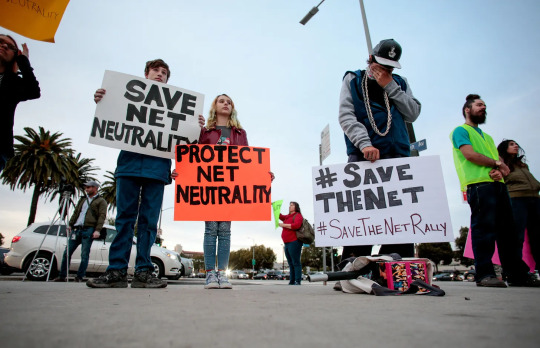
The U.S. Federal Communications Commission voted 3-2 on Thursday to reinstate landmark net neutrality rules and reassume regulatory oversight of broadband internet rescinded under former President Donald Trump.
2. Airlines required to refund passengers for canceled, delayed flights

DOT will also require airlines to give cash refunds if your bags are lost and not delivered within 12 hours.
The refunds must be issued within seven days, according to the new DOT rules, and must be in cash unless the passenger chooses another form of compensation. Airlines can no longer issue refunds in forms of vouchers or credits when consumers are entitled to receive cash.
3. How new mosquito nets averted 13 million malaria cases

Compared to standard nets, the introduction of 56 million state-of-the-art mosquito nets in 17 countries across sub-Saharan Africa averted an estimated 13 million malaria cases and 24,600 deaths. The New Nets Project, an initiative funded by Unitaid and the Global Fund and led by the Innovative Vector Control Consortium (IVCC), piloted the use of dual-insecticide nets in malaria-endemic countries between 2019 and 2022 to address the growing threat of insecticide resistance.
4. Germany has installed over 400,000 ‘solar balconies’

This new wave of solar producers aren’t just getting cheap electricity, they’re also participating in the energy transition.
More than 400,000 plug-in solar systems have been installed in Germany, most of them taking up a seamless spot on people’s balconies.
5. Voyager-1 sends readable data again from deep space

The US space agency says its Voyager-1 probe is once again sending usable information back to Earth after months of spouting gibberish.
The 46-year-old Nasa spacecraft is humanity's most distant object.
6. Missing cat found after 5 years makes 2,000-km journey home
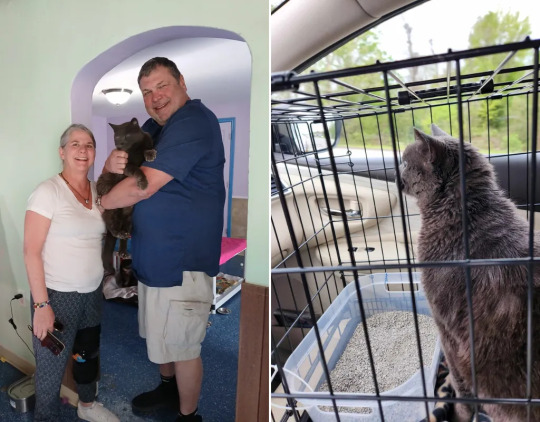
Five years after it ran out the door, a lost cat was returned to a couple in Nevada after it was found thousands of kilometres away. The couple are praising the cat’s microchip for helping reunite them.
7. Restoring sight is possible now with optogenetics
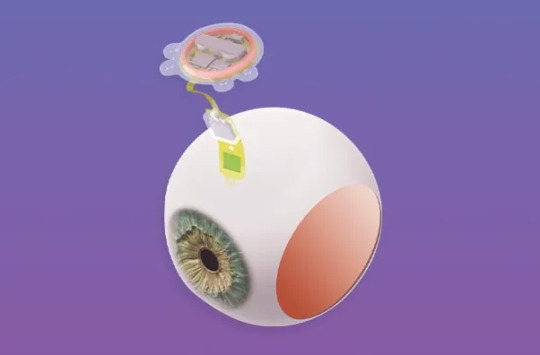
Max Hodak's startup, Science, is developing gene therapy solutions to restore vision for individuals with macular degeneration and similar conditions. The Science Eye utilizes optogenetics, injecting opsins into the eye to enhance light sensitivity in retinal cells.
Clinical trials and advancements in optogenetics are showing promising results, with the potential to significantly improve vision for those affected by retinal diseases.
---
That's it for this week :)
This newsletter will always be free. If you liked this post you can support me with a small kofi donation here:
Buy me a coffee ❤️
Also don’t forget to reblog this post with your friends.
653 notes
·
View notes